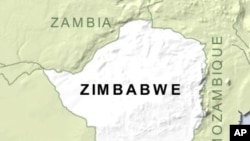The German ambassador to Zimbabwe says Western countries and major international financial institutions have changed their engagement with the country's inclusive government during the past few months. The countries, who have aligned themselves in a group they call Friends of Zimbabwe, have established ways to begin financing the rebuilding of the country's shattered infrastructure.
German Ambassador Albrecht Conze explained how the Friends of Zimbabwe group agreed in October to a new formula that has taken international funding from providing only humanitarian assistance to funding developmental projects. He said this was a response to greater political stability in Zimbabwe.
Addressing a media briefing in Harare, Conze said under the new formula the money is held in a trust fund managed by the World Bank and distributed by the United Nations.
"Donor support, for the time being, cannot be done through classical instruments like financial aid or budgetary aid as Zimbabwe is not yet out of the corner it had maneuvered itself into over the past 10 years," he said.
He added that two sectors, agriculture and education, are receiving assistance from the trust fund.
The Friends of Zimbabwe includes the United States, Australia, Canada, Denmark, Finland, France, Germany, Ireland, Italy, Japan, Netherlands, New Zealand, Norway, Spain, Sweden, Switzerland, the United Kingdom, the European Commission, the European Union, the International Monetary Fund, the World Bank, the African Development Bank, and the United Nations.
Conze said the group wanted to support Zimbabwe's transitional government, even while limited U.S. and EU sanctions exist that do not allow government-to-government aid.
He said Finance Minister Tendai Biti's budget was a dramatic example of the need for donor support.
"There is a clear indication that more than $800 million are missing," he said. "He knows he can only get this from donors. Where else should he get it from? Zimbabwe is still working on a cash budget, the country has practically no credit lines, its international rating does not permit it going to the capital market."
Conze said the Western countries hoped all outstanding issues of the so-called global political agreement (GPA) which led to formation of the unity government in February would soon be implemented.
"Once this GPA has been implemented and once you have your new constitution and once you have free and fair elections, [then] that is more or less the road map for full engagement of the international community," Conze said.
He added that the Friends of Zimbabwe group hoped the country would be able to regain its voting rights at the International Monetary Fund's spring meeting next June.
Conze said that attitudes of the West towards Zimbabwe had been strongly influenced by Prime Minister Morgan Tsvangirai's statement earlier this year that although President Robert Mugabe was part of Zimbabwe's problems, he was also key to solving the country's 10-year crisis.
News
Western Donors say Zimbabwe's Budget Needs Their Support
update

The German ambassador to Zimbabwe says Western countries and major international financial institutions have changed their engagement with the country's inclusive government during the past few months. The countries, who have aligned themselves in a group they call Friends of Zimbabwe, have established ways to begin financing the rebuilding of the country's shattered infrastructure.



